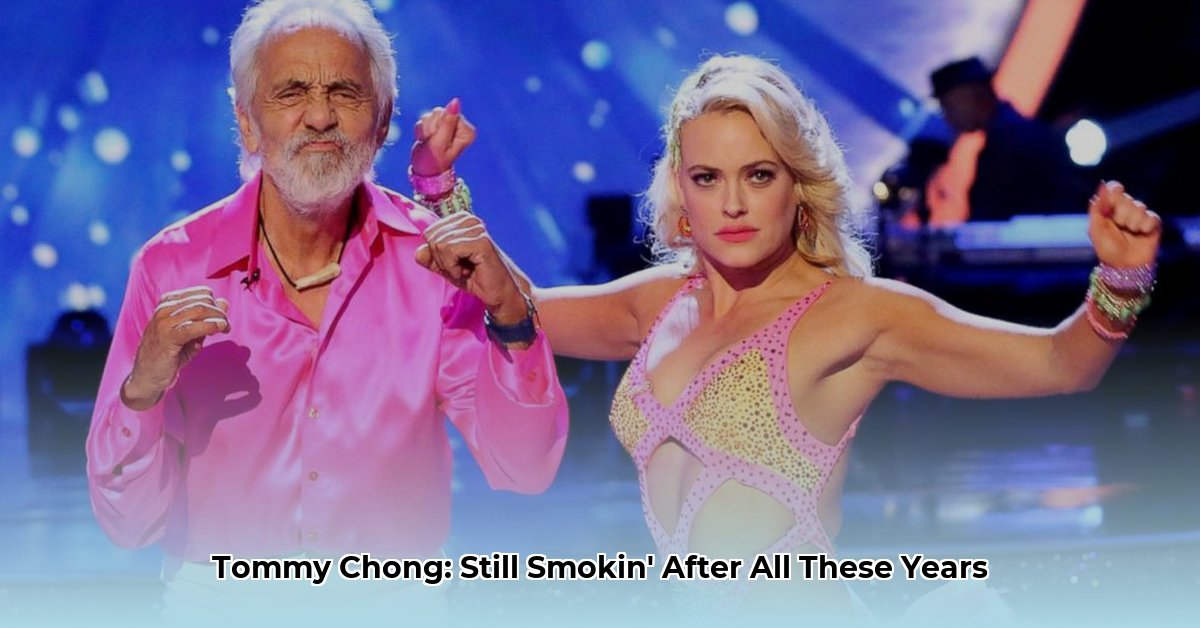Tommy Chong: comedian, musician, actor, writer, activist, and counter-culture icon. His career, a hazy blend of laughter, legal battles, and laid-back vibes, has spanned decades, leaving an indelible mark on entertainment. From his early days strumming a guitar in Calgary to becoming one-half of the legendary Cheech & Chong, Chong’s journey is as captivating as it is unconventional. Let’s embark on a chronological exploration of this fascinating career, delving into the highs and lows, the laughter and the legal challenges, and the enduring legacy of a true original.
Early Riffs and Rhythms: Chong’s Musical Roots
Born Thomas B. Kin Chong in 1938 in Edmonton, Alberta, to a Scottish-Irish mother and Chinese immigrant father, Chong’s early life was a melting pot of cultures, likely influencing his unique comedic perspective. His passion for music emerged early, leading him to drop out of high school at 16 to pursue his dreams. This early embrace of music may have been the genesis of his creative spirit, setting the stage for his diverse career.
Chong’s musical journey took flight in the early 1960s as a member of the Calgary soul group, the Shades. Relocating to Vancouver, they rebranded as Little Daddy & the Bachelors, even releasing a single. This period highlights his drive and willingness to experiment. He co-founded the Blues Palace nightclub in Vancouver in 1963, showcasing his entrepreneurial spirit. The venue hosted iconic acts like Ike & Tina Turner, further immersing Chong in the music scene.
Later joining Bobby Taylor & the Vancouvers, Chong experienced a taste of mainstream success with their Motown-signed hit, “Does Your Mama Know About Me,” which he co-wrote. Ironically, he was fired from the group for missing a gig. This seemingly unfortunate event proved pivotal, opening doors for his future comedic endeavors. This period suggests that setbacks can sometimes be fortunate detours, propelling individuals toward their true calling.
The Birth of a Comedy Duo: Cheech & Chong’s Hazy Reign
Chong’s musical background provided the foundation for his comedic partnership with Cheech Marin. Their humor, infused with cannabis-themed jokes and social commentary, resonated with a generation questioning authority. Cheech & Chong became more than comedians; they were cultural commentators capturing the zeitgeist of the counter-culture movement.
The duo’s comedy albums, starting with their self-titled debut in 1971 and culminating in the Grammy-winning Los Cochinos (1973), became anthems for a generation. Their irreverent humor and relatable observations on life transcended mere jokes, becoming part of the cultural tapestry. Catchphrases like “Dave’s not here, man” became instantly quotable, solidifying their place in comedic history.
Their transition to film with Up in Smoke (1978) was a game-changer. The film, a blend of stoner humor and social satire, wasn’t just a box office hit; it cemented their status as comedic icons. The iconic lowrider, fueled by weed, riffs, and comedic genius, became a symbol of their unique brand of humor. While the subsequent sequels, Next Movie (1980), Nice Dreams (1981), and Still Smokin’ (1983), didn’t achieve the same critical acclaim, they solidified their fanbase and added to their growing comedic legacy.
Beyond the Haze: Chong’s Solo Ventures
Chong’s talent extended beyond the hazy confines of Cheech & Chong. His portrayal of Leo on That ’70s Show introduced him to a new generation, solidifying his status as a comedy legend. He wasn’t just playing a stoner; he became the archetype. His voice work in animated films like Zootopia (2016) showcased his versatility. He also continued stand-up comedy, keeping his comedic edge sharp and his connection with audiences strong. His appearances on shows like Dharma & Greg and Franklin & Bash demonstrated his ability to navigate diverse comedic roles.
Activism and Advocacy: Chong’s Fight for Cannabis Legalization
Chong’s advocacy for cannabis legalization intertwined with his personal and professional life. His 2003 arrest for selling bongs online through his company, Nice Dreams Enterprises, became a turning point. The nine-month prison sentence sparked outrage, highlighting the growing disconnect between the law and public opinion on cannabis. This incident likely fueled support for legalization, with Chong becoming a symbol of the movement.
His post-prison activism, partnering with NORML (National Organization for the Reform of Marijuana Laws), amplified his voice. He leveraged his celebrity to advocate for reform, challenging societal norms and pushing for change. While the long-term impact of his activism is still unfolding, it undeniably contributed to the ongoing shift in public perception and policy regarding cannabis.
The Legacy Continues: Chong’s Enduring Impact
Chong’s career wasn’t a straight line; it was a journey of reinvention and resilience. From his early musical explorations to his comedic partnerships and solo ventures, he consistently adapted and evolved. His reuniting with Cheech Marin for tours and appearances in That ’90s Show demonstrated the enduring power of their comedic connection. His embrace of digital platforms, through podcasts and online presence, allowed him to connect with new generations.
Tommy Chong’s legacy is not just about laughter, though that’s certainly a big part of it. It’s about challenging norms, pushing boundaries, and using his platform to advocate for what he believes in. His story, with its highs and lows, its humor and its activism, reflects the changing cultural landscape, showcasing the enduring power of a unique voice. What’s next for Tommy Chong? Only time will tell, but given his dynamic career, it’s bound to be interesting.










